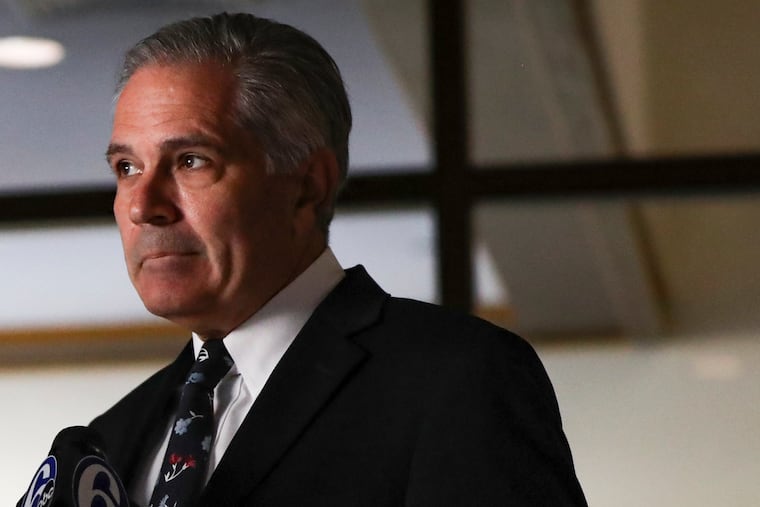Tensions are boiling over between Philly DA Larry Krasner and bail reform advocates
The Philadelphia Bail Fund plans to release a report accusing Krasner of falling short of his pledge to help limit pretrial incarceration during the coronavirus pandemic.

Philadelphia District Attorney Larry Krasner has frequently been accused by officials, including Mayor Jim Kenney, of being too lenient with defendants amid an ongoing surge in gun violence. But he’s now facing criticism from people with the opposite perspective, as bail reform advocates say his office has too often tried to send people accused of crimes to jail during the coronavirus pandemic.
The advocates, who want to end the practice of jailing some defendants before trial unless they pay to be released, have been frustrated before over when and how often Krasner’s office asks judges to detain people before trial.
But tensions have boiled over recently, with Krasner telling the news organization Democracy Now that the city’s community bail funds had helped free one man who was murdered shortly after his release, and another who went on to commit a sexual assault. Advocates cast those remarks as “racist” and ”fear-mongering,” similar to the rhetoric used by tough-on-crime prosecutors whom Krasner has regularly disparaged.
Now the Philadelphia Bail Fund plans to release a report accusing Krasner of falling short of his pledge to help limit pretrial incarceration during the pandemic, saying his office has frequently asked judges to set bail at $999,999, even in some cases in which people were facing only misdemeanor or drug possession charges.
“What the report boils down to is the huge gap between rhetoric and reality,” said Malik Neal, director of the fund, which uses donations to help pay people’s bail and get them out of jail while awaiting trial.
Krasner’s spokesperson, Jane Roh, said the forthcoming report, an early version of which was shared with The Inquirer, omits important context, including the fact that the city’s jail population recently dropped below 3,600 people, the lowest total in years. She also said bail hearings during the pandemic have involved more serious or violent cases because police deferred arrests for some nonviolent crimes.
» READ MORE: Krasner plans ‘truth, justice, and reconciliation commission’ to review harm caused by justice system
The city also is in the midst of its most violent year in more than a decade, having recorded 243 homicides so far in 2020 — almost as many as in all of 2013. Some police officials have been quick to point out that the steady climb in homicides over the last several years has occurred as the city simultaneously reduced the number of people in jail.
Krasner is among the officials who have described that as an overly simplistic view that doesn’t account for the myriad of potential reasons behind the surge in gun violence. He has also pointed to a 2019 academic study that said reducing the use of cash bail for low-level offenses in Philadelphia had not caused an increase in recidivism or pretrial crime.
The Philadelphia Bail Fund says in its new report that it reviewed a random selection of 451 bail hearings between March 21 and May 21. Krasner’s office requested bail be set at $999,999 in more than half those cases, the report says, including about 40 cases where people were facing only misdemeanor or drug possession charges.
The vast majority of defendants that prosecutors sought to detain were Black, the report says, and 60% of the cases it reviewed did not include a lead charge of aggravated assault, rape, robbery, or illegal possession of a firearm. Early in the pandemic, Krasner modified his bail policy to say prosecutors would request high bail for defendants deemed dangerous while asking for others to be released without requiring payment.
Neal acknowledged that the report did not consider all the factors prosecutors weigh when making bail requests, such as the specific allegations included in an arrest or charging report, or a defendant’s criminal history. The fund’s view, Neal said, is that all pretrial defendants are presumed innocent.
The report also points out that magistrate judges ultimately set bail after hearing arguments from the District Attorney’s Office and defense lawyers. In cases the bail fund reviewed, magistrates overwhelmingly set bail lower than $999,999 when prosecutors requested it.
During an interview last week with Democracy Now, Krasner addressed criticism that he has sought to keep too many people in prison amid the pandemic, calling some of his critics’ judgments “cynically out of context.” He also pointed out that the city’s jails had not experienced a widespread coronavirus outbreak, as was initially feared.
» READ MORE: Larry Krasner is happy driving his opponents ‘crazy’ as he seeks reelection as Philly DA
He then went on to accuse unspecified bail funds of freeing a man with several recent drug cases just days before he was murdered and freeing a domestic violence suspect before he sexually assaulted his partner.
“It is not the case that every single person should get out all of the time,” Krasner said. “It is not the case that simply saying, no matter what the offense, no matter what the record, and no matter what the circumstances, everyone should get out.”
Neal said Krasner’s remarks were “fear-mongering tactics to justify his attempt to detain over half the people arrested pretrial.”
Candace McKinley, lead organizer with the Philadelphia Community Bail Fund, a separate organization, said the two funds combined have posted bail for almost 1,000 people, some of whom had their cases dropped or dismissed. Krasner, she said, was “cherry-picking a few sensational stories to paint all people charged with a crime as dangerous criminals.”
Even as Krasner fielded such criticisms, he released a statement criticizing a decision issued Monday by the Pennsylvania Supreme Court, in which the high court said the city’s cash bail system was “essentially sound.”
Krasner called the system “unjust and overly punitive,” and said it was “disappointing that the state’s highest court has not met this moment” to help engineer further changes.